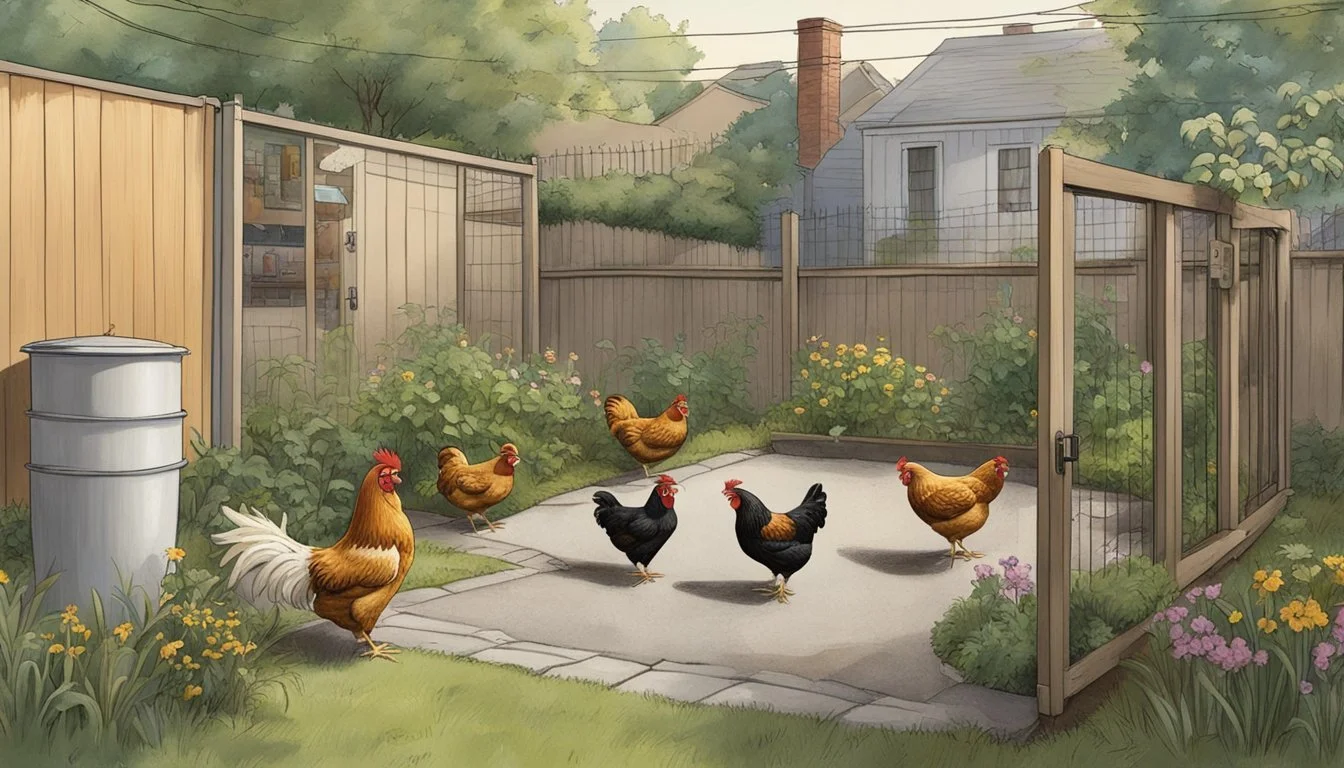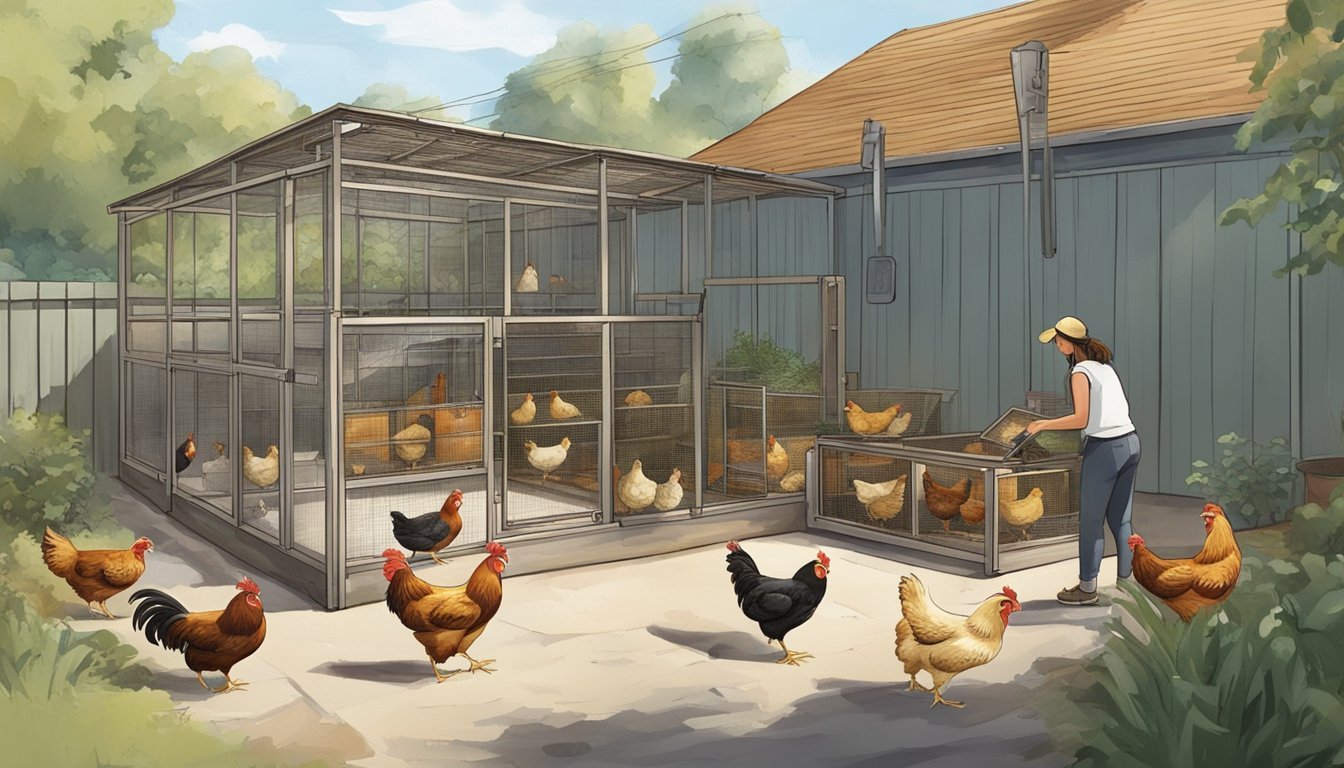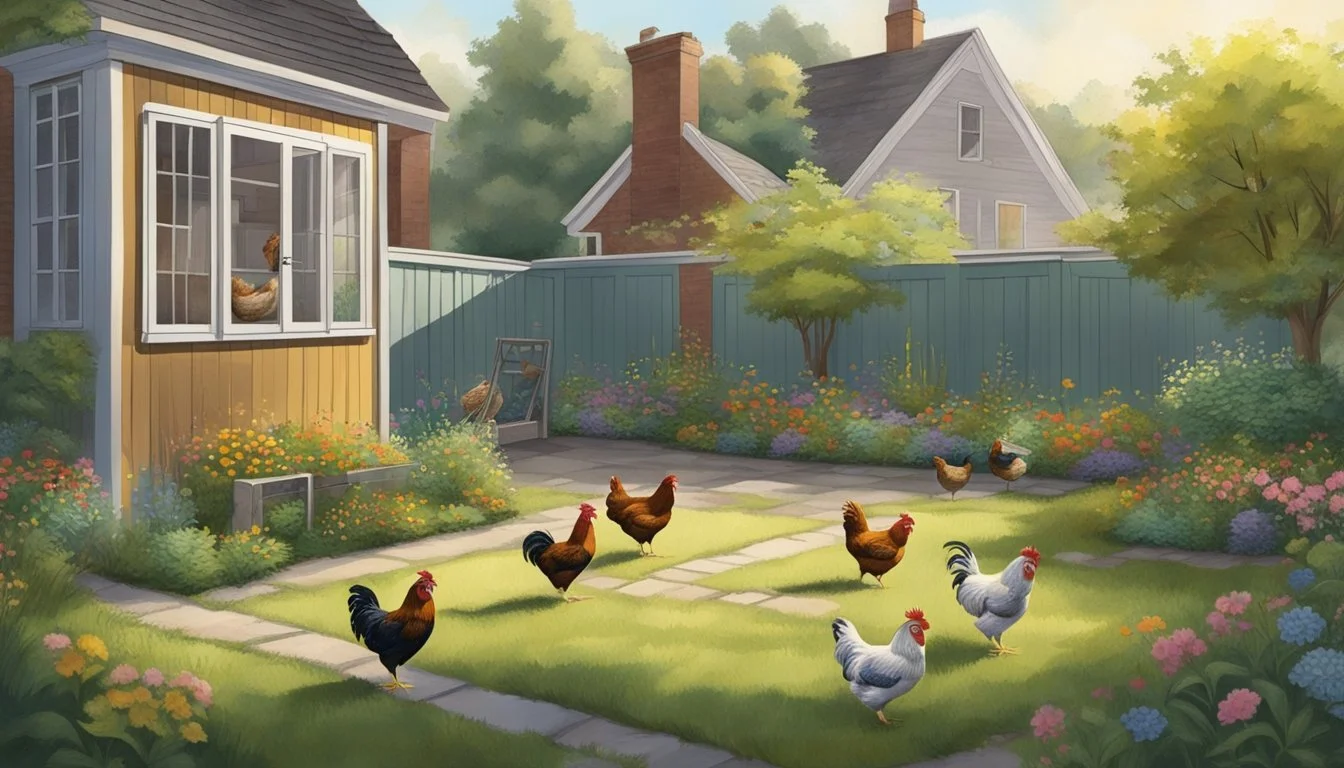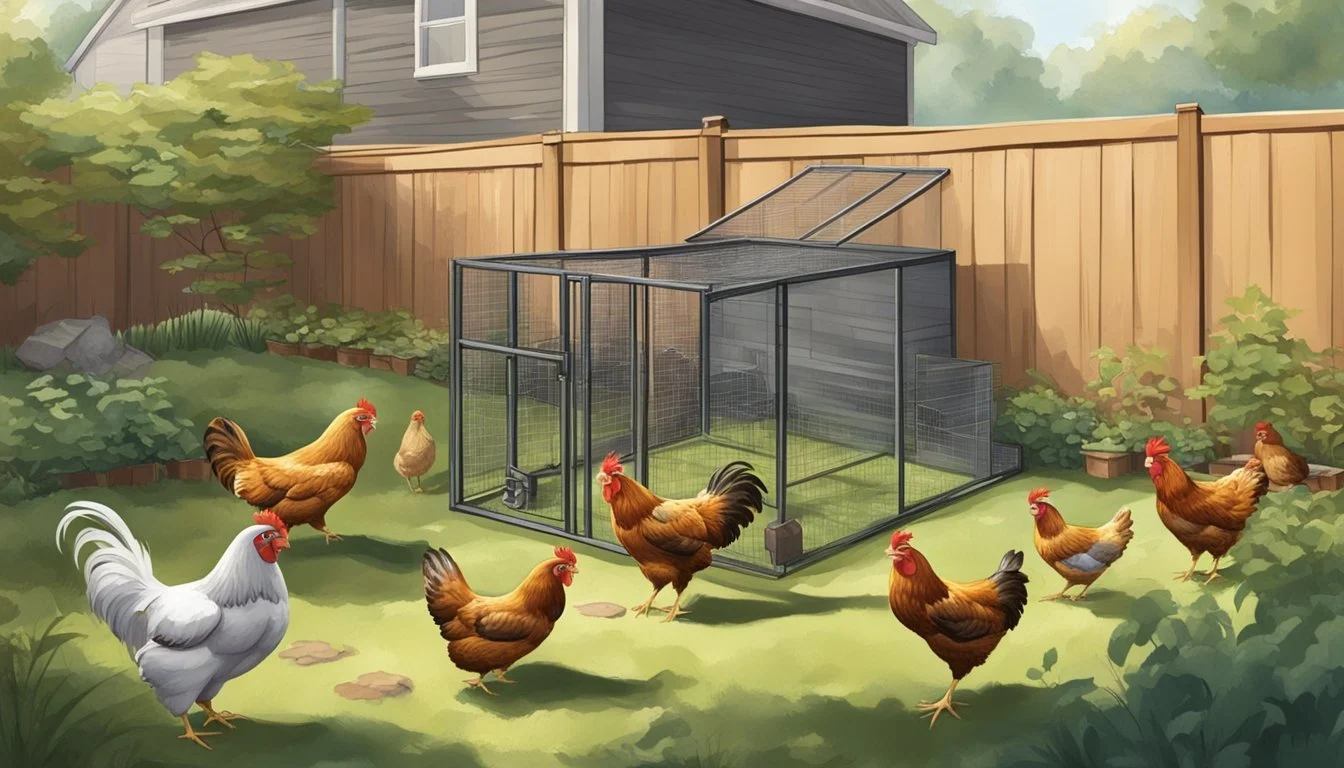How to Manage Chickens in an Urban Setting
Essential Tips for City Poultry Keeping
Managing chickens in an urban setting presents a unique set of challenges and rewards for backyard chicken enthusiasts. City dwellers keen on embracing a slice of country life can indeed keep chickens, provided they navigate local ordinances and space constraints effectively. Urban environments require more meticulous planning and consideration to ensure the health and safety of the chickens, as well as the peace and comfort of nearby neighbors.
Careful selection of breeds is essential for urban chicken keeping, with consideration for noise level, size, and the ability to thrive in smaller spaces. Bantam chickens, for instance, are often suitable for urban homesteads due to their diminutive size. Housing for backyard chickens must be planned with precision, offering sufficient space for each bird to roam, roost, and retreat.
Moreover, maintaining cleanliness within coops is more than a matter of hygiene—it's also about neighborly consideration. Controlling odors and noise is crucial to prevent disturbances and complaints. Regular cleaning of the coop, proper feeding, and waste management are practices that responsible urban chicken keepers must adopt to foster a harmonious existence with their feathered friends in a densely populated area.
Understanding Local Ordinances
Before starting an urban chicken coop, it’s crucial to navigate the tapestry of local ordinances to ensure compliance. Knowing the city regulations, understanding HOA restrictions, and maintaining good neighbor relations can safeguard both your investment in poultry and your peace of community living.
City Regulations
Urban chicken keepers must adhere to city regulations, which often dictate whether chickens are allowed, the number of hens permitted, coop placement and specifications, and whether roosters are prohibited due to noise concerns. For instance, some cities may have ordinances that do not allow roosters because of their crowing. Compliance with these regulations is crucial to legally keep chickens within city limits.
HOA Restrictions
Homeowners’ associations (HOA) frequently have their own set of rules which may be more restrictive than city ordinances. These regulations can include the type of chicken breeds allowed, the aesthetics of the coop, and additional noise abatement measures. Checking your HOA bylaws before introducing chickens to your urban home is essential to avoid potential disputes. An example of these restrictions can be found through urban chicken keeping tips.
Neighbor Relations
Maintaining neighbor relations plays an important role in urban chicken keeping. Even if local ordinances permit chickens, disputes can arise from noise, odor, or property line encroachments. Keeping neighbors informed and addressing their concerns promptly can foster a harmonious environment. Participation in local urban chicken associations might help advocate and mediate any issues, as suggested by various community-oriented urban chicken guidelines.
Planning Your Chicken Space
When managing chickens in an urban setting, one must thoughtfully consider the available space, anticipate protection from predators, and ensure the shelter is designed with proper ventilation.
Assessing Space Requirements
Urban chicken keepers should start by evaluating their backyard size to determine the appropriate location for a chicken coop. Consider the existing space and plan for a coop that accommodates the chickens comfortably without overwhelming the yard. Chickens need enough room to roam, rest, and engage in natural behaviors. A good rule of thumb is 2-3 square feet per bird inside the coop and 8-10 square feet per bird in the run.
Security Against Predators
Safety is a paramount concern in urban chicken keeping. It is crucial to reinforce the coop to protect against predators such as raccoons, foxes, and even domestic pets. Utilize sturdy materials for the coop's construction, secure all entry points with locks or latches, and consider burying a fence at least a foot deep around the perimeter to deter digging predators. One practical tip is to keep your coop covered to provide an extra layer of protection.
Shelter Design and Ventilation
Designing the chicken shelter with adequate ventilation is essential to maintain air quality and regulate temperature. Ensure that there are multiple vents or windows that can be opened or closed depending on the weather. Facilities for feeding and watering should be easily accessible and protected from the elements. The appearance of the coop should complement your urban environment, being both functional and aesthetically pleasing to blend with your backyard's design.
Selecting Chicken Breeds
When managing chickens in an urban setting, choosing the right breeds is crucial for ensuring they thrive and meet your egg production goals. The following subsections will help guide you in selection based on adaptability, egg laying, and temperament.
Adaptability to Urban Living
Some chicken breeds are better suited for urban living due to their size, space requirements, and ability to tolerate closer quarters. Bantam chickens, such as the Brahma and the Sultan, are smaller and require less space, making them ideal for smaller yards. The Orpington is known for being docile and quiet, which is advantageous for keeping neighbors content.
Egg Production Characteristics
Urban chicken keepers often prioritize egg production. Australorps and Rhode Island Reds are both excellent choices for reliable and plentiful egg production. They consistently produce eggs, with Australorps known to lay approximately 250 eggs per year. Easter Eggers are also popular for their colorful eggs, although their production can be more variable.
Temperament
The disposition of a chicken can significantly impact its suitability for urban settings. It is essential to choose breeds that are friendly and less prone to noise. The Silkie is renowned for its gentle nature, and despite its fluffy appearance, it is quite hardy. Conversely, the Barred Rock is known for its even temperament and robustness, making it a favored choice for first-time chicken keepers.
Daily Management and Care
Successful urban chicken keeping requires diligent daily management and care, focusing on nutrition, hydration, and cleanliness to ensure the health and productivity of the flock.
Feeding and Diet
Chickens thrive on a balanced diet consisting of quality chicken feed, which should be the primary source of their nutrition. It is crucial to provide a mix of grains, proteins, vitamins, and minerals. Layer feed is typically recommended for hens that are actively producing fresh eggs, containing extra calcium to support shell strength. Feed should be dispensed in a feeder to keep it clean and minimize waste.
Water and Hydration
Chickens require constant access to water. Waterers should be cleaned and refilled daily with fresh water to ensure the birds stay hydrated and healthy. During winter months, one might need to prevent water from freezing, while in the summer, ensuring that the water stays cool and refreshing for the chickens is important.
Routine Cleaning
Regular cleaning of the coop is imperative to prevent the build-up of waste and odor, which can lead to health issues and attract pests. Bedding should be changed frequently, and droppings should be removed daily. Scrubbing the coop and disinfecting the water and feed containers weekly helps maintain a clean environment for the chickens.
Health and Welfare Monitoring
Maintaining the health and welfare of chickens in an urban setting requires vigilant monitoring and proactive management. It's crucial for keepers to recognize signs of illness promptly, undertake preventive measures consistently, and ensure access to professional veterinary care.
Recognizing Illness Signs
Chickens can't communicate discomfort like humans, so observing behavior and physical indicators is vital. Keepers should look for signs such as lethargy, abnormal droppings, a decrease in egg production, or changes in eating and drinking habits. The presence of respiratory distress, such as coughing or sneezing, can also be a signifier of underlying health issues. Deviations from normal behavior or appearance often indicate that a chicken is unwell.
Preventive Measures
Preventive care is a cornerstone of animal welfare. Regularly scheduled tasks like deworming, vaccination, and parasite control can prevent common diseases. Keeping the coop clean and dry helps to deter pests and maintain a sanitary environment. Adequate nutrition is fundamental; chickens require a balanced diet and a constant supply of clean water. Encouraging natural behaviors by allowing space for free-ranging can bolster the immune system naturally.
Veterinary Care
Even with diligent care, chickens may fall ill. Access to a veterinarian who specializes in avian medicine is imperative. They will advise on treatments, administer necessary vaccines, and handle emergencies. Regular health check-ups can catch issues before they develop into serious problems. Keeping records of health concerns and treatments ensures a structured approach to each chicken's welfare and can be used to appraise the effectiveness of the preventive measures in place.
Handling Eggs and Meat Production
In the context of urban chicken raising, managing eggs and meat requires diligence to ensure food safety and compliance with local ordinances. Urban chicken keepers should be well-versed in the best practices for handling eggs from collection to storage, as well as the regulations and methods involved in processing chickens for meat.
Egg Collection and Storage
Urban chicken keepers should collect eggs daily to prevent them from becoming dirty or damaged. After collection, it is important to clean the eggs with water and a mild detergent, then dry them immediately to avoid bacterial growth. For safe consumption, eggs must be stored properly. They can be placed in an egg carton and kept in the refrigerator, where the temperature should be kept at or below 40°F (4°C). Contrary to some store-bought eggs which are washed and sanitized through a different process, these eggs boast a natural protective coating and therefore have a decent shelf-life when refrigerated.
Processing Chickens for Meat
The processing of chickens for meat in urban settings is subject to local laws and regulations, often requiring specific methods of slaughter to maintain humane standards. Once cleared, chicken keepers must have the proper equipment and environment that is clean and well-maintained to process chickens. They should be knowledgeable about the steps: from humanely dispatching the bird to evisceration and proper cooling. The meat must be promptly refrigerated or frozen after processing to guarantee food safety. Unlike commercially available meat, home-processed chicken allows urban farmers to ensure the quality and handling of their meat from start to finish.
Dealing with Noise and Odor Control
Managing chickens in an urban setting requires careful attention to noise and odor issues to maintain a harmonious relationship with neighbors. Effective strategies for rooster management and odor reduction are crucial.
Rooster Management
To address noise concerns, focus on managing roosters, as they are the primary source of loud crowing. Some urban chicken keepers opt to keep hens only, which eliminates the noise problem entirely. If roosters are kept, consider soundproofing measures for the coop or using "no-crow" collars that minimize the volume of crowing without causing harm to the rooster.
Odor Reduction Strategies
Odor control begins with regular cleaning of the chicken coop. Use absorptive materials, such as straw or wood shavings, to manage smell and make routine cleaning easier. Additionally, incorporate proper composting techniques for chicken waste. Properly maintaining a compost pile accelerates the breakdown of waste and significantly reduces unpleasant odors.
Building a Community Connection
Urban chicken keeping provides not only fresh eggs but also an avenue for community members to bond over shared interests in sustainability and local food production. This section delves into how urban chicken keepers can foster social interactions and educate others through the communal aspects of their hobby.
Sharing Produce and Education
Community engagement often starts with the sharing of resources. Urban chicken keepers can contribute to the local food network by distributing surplus eggs among neighbors, which encourages a sustainable cycle of food production. Additionally, teaching others about the nutritional value and the taste difference of fresh eggs compared to store-bought ones can be enlightening. By organizing workshops or informal gatherings, they can educate their community about responsible chicken care, underscoring the importance of animal welfare and sustainable practices.
Engaging with Urban Agriculture
Urban agriculture is burgeoning and chickens play a pivotal role in this movement. Residents can engage with initiatives like community chicken coops, fostering a spirit of collaboration. They directly contribute to urban agriculture, learning and sharing techniques of chicken raising in limited spaces. This involvement not only enhances their social interaction but also promotes a model of living that values self-sufficiency and environmental responsibility. Through such collective efforts, each participant becomes an active ambassador for urban sustainability.
Waste Management and Composting
Managing chicken waste efficiently is crucial in an urban setting to maintain cleanliness and sustainability. Proper composting transforms chicken manure into a valuable fertilizer for gardens, while also minimizing pest issues.
Composting Chicken Manure
Chicken manure is rich in nitrogen, making it an excellent addition to a composting regimen. To start, one can create a balanced compost by combining the manure with carbon-rich materials, such as straw or wood shavings. The compost should be kept moist and turned regularly to aerate the pile and speed up the decomposition process. This method not only recycles waste but also produces a high-quality fertilizer that can enhance soil health. Frequent testing is advised to ensure that the compost has matured appropriately, reaching optimal nutrient levels suitable for garden applications.
Avoiding Pest Issues
To prevent attracting pests like flies and rodents, it is essential to manage the compost correctly. This involves covering fresh manure with a carbon layer to reduce odors that attract pests. Additionally, maintaining the correct moisture level and turning the pile frequently can deter pest breeding. Securing the composting area with a sturdy bin or enclosure can also help keep pests at bay. It is important to note that an actively managed compost heap will reach higher temperatures, further discouraging pest infestation and facilitating the breakdown of potential contaminants.
Creating a Safe and Enjoyable Environment
To successfully manage an urban chicken coop, prioritizing safety for children and pets, alongside creating practical yet appealing landscaping, is essential. These considerations ensure that chickens thrive and contribute positively to the home environment.
Child and Pet Safety
Children should be educated on how to interact safely with the backyard flock. Clear rules regarding gentle handling and hygiene, such as washing hands after touching the chickens or coop, can prevent the spread of bacteria like salmonella. It’s also crucial to supervise interactions to safeguard both the children and the chickens.
For pets, especially dogs and cats, proper introductions are necessary to foster peaceful coexistence with the chickens. Secure fencing around the coop helps prevent unwanted encounters that could pose a risk to the birds. Additionally, training pets to respond to commands can mitigate potential hazards, ensuring they respect the chickens’ space.
Attractive and Functional Landscaping
In urban chicken keeping, landscaping plays a dual role in enhancing the visual appeal of the space while meeting the needs of the chickens. Grasses and other insects-attracting plants can provide natural food sources for the flock, contributing to their diet and ensuring they perform pest control.
Selecting robust plant species that can tolerate the scratching and foraging behaviors of chickens is wise, as they will need to withstand the daily activities of a backyard flock. Strategic placement of shrubs and trees can provide shade and protection for the chickens, while simultaneously beautifying the area and adding structure to the garden layout.
Legal and Ethical Considerations
When managing urban chickens, it is imperative to understand and adhere to local regulations and demonstrate a commitment to animal welfare. Failure to comply with legal standards can lead to conflicts with city authorities and undermine the ethical treatment of the chickens.
Navigating City Limits and Legalities
Urban areas often have specific restrictions related to the keeping of livestock, including chickens. They need to check with their city's municipal codes to understand the regulations governing the number of chickens allowed, coop construction standards, and proximity to neighbors. For example, Developing Regulations for Keeping Urban Chickens provides insights into typical urban poultry regulations. They must ensure that their practices are within the city limits to avoid legal repercussions.
Promoting Animal Rights and Welfare
Animal welfare is a significant concern in urban chicken management. Chickens require adequate space, veterinary care, and protection from predators and harsh weather conditions. Adhering to ethical standards such as the Five Freedoms—which include freedom from hunger and thirst; discomfort; pain, injury, or disease; fear and distress; and freedom to express normal behavior—is essential. Information can be gleaned from guidelines such as those discussed in Urban Backyard Chicken Keeping Regulations to help ensure a high standard of care.
Supplementary Advice and Best Practices
In urban chicken keeping, appropriate feed storage and free-ranging practices are crucial for maintaining healthy flocks while adhering to city regulations. These practices play a pivotal role in the well-being of the chickens and the efficiency of operations.
Proper Feed Storage
Storing chicken feed correctly is essential to prevent spoilage and deter pests. In urban settings, where space is at a premium, efficient storage solutions are even more significant. One should opt for metal containers with tight-fitting lids to protect against rodents and maintain the feed's freshness. The United States Department of Agriculture recommends keeping feed in a cool, dry place to prevent the growth of mold.
Containers: Use metal bins with sealing lids.
Location: Store in a cool, dry location away from direct sunlight.
Volume: Keep in proportion to flock size to prevent long-term storage and potential spoilage.
Free-Ranging Within an Urban Setting
Allowing chickens to free-range can be challenging in urban environments, but with proper management, it contributes to their health and reduces feed costs. Before allowing chickens to roam, check city ordinances as some areas may have restrictions. According to North Carolina State University, free-ranging chickens need protection from predators even in urban areas, so a secure enclosure is advisable during unsupervised periods.
Predator Proofing: Secure fences and overhead netting to protect from urban predators.
Supervision: Monitor the flock when they are ranging, especially if the urban yard isn’t fully enclosed.
Local Ordinances: Consult with local regulations to ensure compliance with free-ranging laws.









